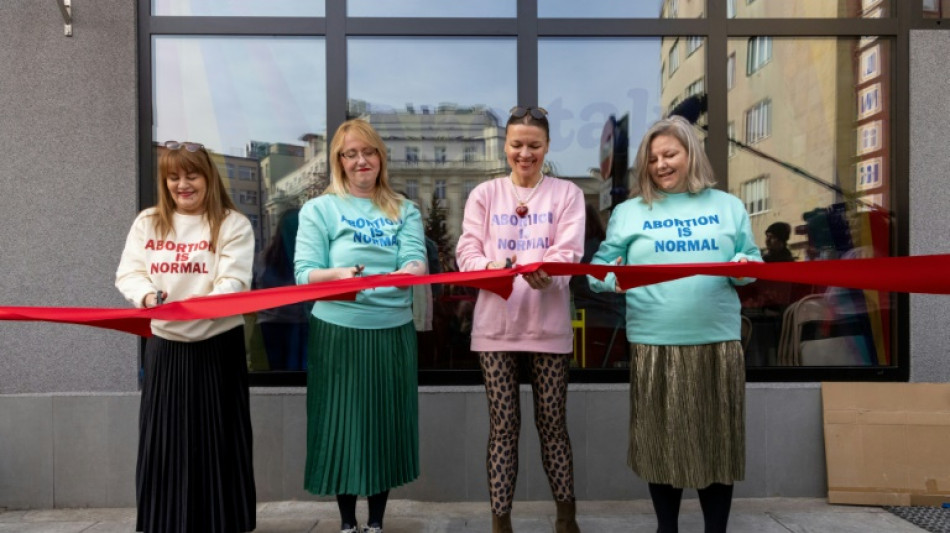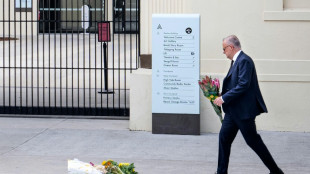
Across from parliament, Poland's first abortion centre opens

As Poland's first abortion centre opened on Friday the choice of location was nothing short of symbolic: just opposite the parliament that failed to follow through on its pledges to relax the country's stringent abortion laws.
Poland has a near-total ban on abortion but in an act of defiance, the activists decided to put pressure on lawmakers by launching a space near the chamber where women considering terminating their pregnancy can get help to do so.
"This is a historic moment in the 32-year history of democratic Poland, because no one had ever managed to do it before," the centre's coordinator Anna Pieta said, her voice shaking.
She spoke to reporters a few minutes after cutting the ribbon and tearing off the paper covering the shop window of the centre that will open to the public on Saturday -- International Women's Day.
The space greets visitors with a red heart-shaped sofa at the entrance. The rest is still under renovation and hidden behind red velvet curtains.
The centre will not be a conventional abortion clinic -- it is designed to resemble "your own home", according to Justyna Wydrzynska, a member of the Abortion Dream Team nonprofit.
"There is a bathroom, a sofa, a place where you can lie down and make yourself a cup of tea or coffee, cover yourself with a blanket, and have an abortion," said Wydrzynska.
"As you would normally do at home," she added.
No law penalises Polish women if they carry out their own abortion, for instance with pills ordered online.
"It's a place where you can come and, in an atmosphere of understanding and acceptance, take your pills and benefit from our support in this process," Wydrzynska added.
- 'Be together' -
Assisting abortion is still punishable by up to three years in jail.
In 2023, Wydrzynska was the first activist in Poland found guilty under these rules, and was sentenced to community service.
In February, a Polish court ordered a retrial in her case and this month, an independent UN-mandated expert urged Poland to acquit Wydrzynska.
Abortion has long been a political battleground in Poland.
In October 2020 its highest court sided with the then-ruling conservative Law and Justice (PiS) party, introducing a near-total ban on the procedure.
Currently, women can only get an abortion in the hospital if the pregnancy results from sexual assault or incest or poses a direct threat to the life or health of the mother.
Before coming to power, Prime Minister Donald Tusk's Civic Coalition has pledged to ease these laws, but has so far lacked the support in parliament to push through the changes.
"Women can come here with their own pills, while for those who can't, we will decide what will happen here: between us and the woman," said activist Natalia Broniarczyk.
The centre will also carry out "group abortions" so that women going through a hard time "can be together and see another person's point of view", said Wydrzynska.
- 'Not afraid' -
Each year, her Abortion Dream Team helps to carry out around 47,000 abortions, including around 2,000 performed abroad.
A network of abortion rights groups, Abortion Without Borders, estimates that up to 150,000 abortions are carried out in the predominantly Catholic country every year.
But according to official numbers, only 896 of those were performed in Polish hospitals in 2024.
The new centre was inaugurated opposite the parliament and other state institutions -- a deliberate snub to the politicians.
"We are taking over part of the most important street in Warsaw to remind politicians every day that we exist, that abortion is a reality and that promises must be kept," said Natalia Broniarczyk.
For reasons of security and anonymity, the centre has a second entrance leading to a courtyard.
On Friday, three protesters stood in front of the main entrance with placards bearing the slogans "No to the death clinic", "Children will be murdered here" and "Murderers".
But Natalia Broniarczyk said the activists were "not afraid".
"The law does not change thanks to political compromises... it changes because certain people decide to continue to push the limits," she added.
L. Pchartschoy--BTZ

 London
London

 Manchester
Manchester
 Glasgow
Glasgow
 Dublin
Dublin
 Belfast
Belfast
 Washington
Washington
 Denver
Denver
 Atlanta
Atlanta
 Dallas
Dallas
 Houston Texas
Houston Texas
 New Orleans
New Orleans
 El Paso
El Paso
 Phoenix
Phoenix
 Los Angeles
Los Angeles



